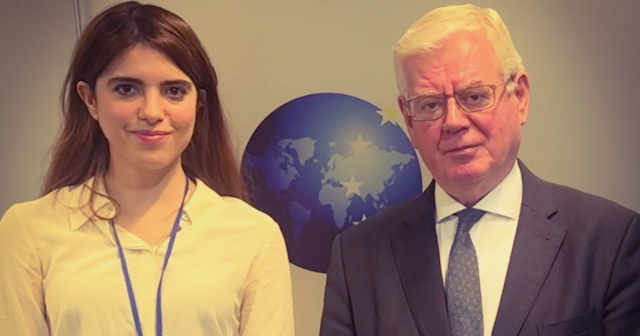The High Representative for Foreign Policy of the European Union (EU),Joseph Borrell, held a meeting this Friday with the rulerMiguel Diaz-Canel, to which he transmitted the position of the countries of the European bloc regardingRussian invasion of Ukraine.
“I have reiterated our clear position on the Russian war of aggression against Ukraine,” Borrell said via Twitter, highlighting Cuba's responsibility with international legality.while he holds the presidency of the G77.
According to the High Representative, the invasion ordered byVladimir Putin on Ukraine constitutes “a threat to global stability and security.” However, the Cuban regime has not missed the opportunity toalign with Moscow's theses and justify Russia's aggression, refusing evidence of war crimes committed by Russian troops and investigated by different international organizations.
“Cuba, as presidency of the G77, has a special role and responsibility in the multilateral sphere, in defense of the charter of the United Nations (UN),” stressed Borrell, whotraveled to Havana to co-chair the third Joint Council of Cuba and the EU, contemplated as part of the Political Dialogue and Cooperation Agreement (ADPC) signed in December 2016.
The meeting, according to the head of European diplomacy, served to take stock of bilateral relations and address the political and sectoral dialogues planned to continue the implementation of the ADPC.
“I held a meeting with the High Representative of the EU, Josep Borrell. We note the contribution of the ADPC to advances in relations between Cuba, the EU and its Member States, and the maturity achieved by addressing various issues in a respectful manner and under principles of reciprocity and equality,” Díaz-Canel indicated for his part.
While European diplomacy pulls its strings to put an end to the Russian invasion of Ukraine, a war that left 18,955 civilian deaths and more than eight million displaced, one year after the Russian attacks began on February 24 .
Thedata, provided by the United Nations until February 13, register 438 children among the deceased, as well as 854 injured minors. The international organization estimates that the figures are “considerably higher” due to the difficulty of confirming deaths in areas where the conflict remains active.
However, Díaz-Canel dedicated himself to highlighting “the positive results of the Third Cuba-EU Joint Council and the significant damage caused by the US blockade and the inclusion of Cuba in the spurious list of countries that supposedly sponsor terrorism. to the links between Cuba and the European Union.”
The meeting was marked bythe “sudden viral affection” of Cuban Foreign Minister Bruno Rodriguez Padilla, which left Borrell without the possibility of meeting his counterpart, while he stated via Twitter that he was “forced to maintain responsible isolation.”
“The EU is the first trade, investment and cooperation partner in Cuba,” said the High Representative, who had to settle for meeting with “representatives of the more than 700 European companies in the country,” tasting guava pastries in Centro Havana and delve into the secrets of corner dominoes.
That same Thursdaya shooting occurred in Central Havana, but Borrell was convinced that, in the future, Cuba is destined to be a “new Mallorca.” A few meters from where he approached the “Cuban reality”, half demolished and closed, the headquarters of theSan Isidro Movement, whose leaders, the artistLuis Manuel Otero Alcántara and the rapperMaykel Osorbo, remain in prison for exercising the right to freedom of expression.
To address his situation and that of the more than a thousand political prisoners of the Cuban regime,The EU decided to send its Special Envoy for human rights, Eamon Gilmore, who will travel to Havana next November.
Prevented from having exchanges with the Cuban Foreign Minister and leaving meetings with relatives of political prisoners, activists, independent journalists and opponents out of his agenda, Borrell returned to Brussels amid strong reproaches fromCuban civil society, and supporting once again the regime's disdain for the community bloc.
What do you think?
SEE COMMENTS (5)Filed in:
